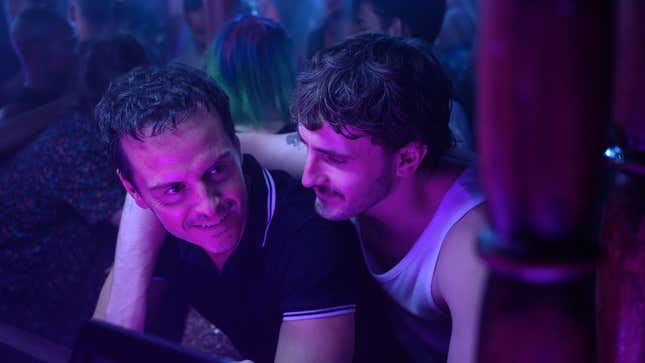‘All of Us Strangers’: A Profoundly Moving Fantasy
Andrew Haigh's devastating new movie features a romance between characters played by heartthrobs Paul Mescal and Andrew Scott.
EntertainmentMovies

At a certain point in the middle of Andrew Haigh’s gentlest of psychodramas, All of Us Strangers, I thought to myself, “Is there anything this movie can’t do?” It had already introduced me to the ghosts (of sorts) of the parents of protagonist Adam (Fleabag’s Andrew Scott), reminded me of the greatness of Frankie Goes to Hollywood (the synthpop group’s 1984 “The Power of Love” provides a motif), and shown me one of the most erotic blowjob sequences I’ve ever seen in a mainstream movie (it’s Paul Mescal as Harry doing the servicing, and it manages to be explicit without being revealing). And then, it hit me with a club scene that nails the dissociative properties of ketamine, features a backlit makeout session between Adam and Harry (beams of light jut through their open mouths), uses Blur’s 1997 song “Death of a Party,” and ends in a scream.
I was completely amazed, and then some 10 minutes later, I cried watching Adam and his parents (played by Claire Foy and Jamie Bell) decorate the Christmas tree while singing along to the Pet Shop Boys’ cover of “Always on My Mind,” a song I love but find almost as hard to listen to as the sun is to look at. It’s just that sad. Neil Tennant’s mourning voice cuts through the hi-NRG disco arrangement, jubilance shading in the sadness. I felt like the movie was speaking directly to me.
-

-

-

-

-

-

-

-

-

-

-

-

-

-

-

-

-

-

-

-

-

-

-

-

-

-

-

-

-

-

-

-

-

-

-

-

-

-

-

-








































